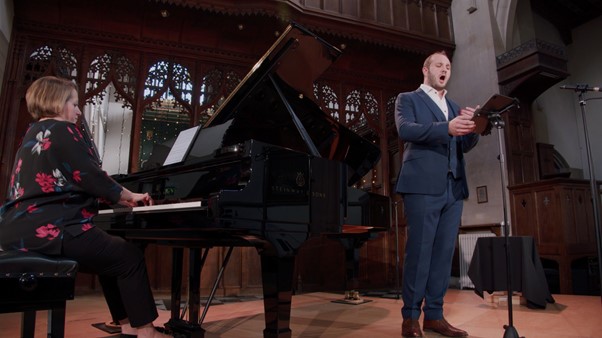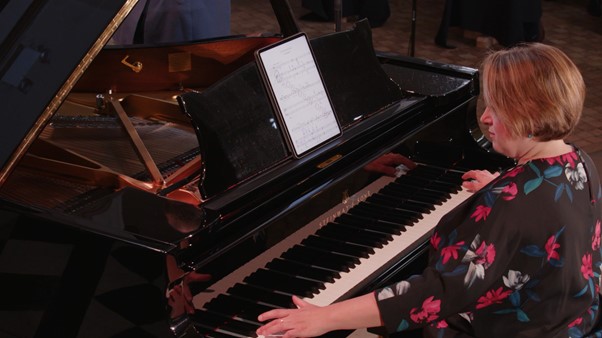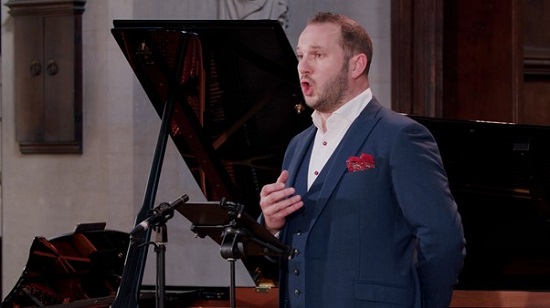The Oxford Lieder Festival is celebrating its 20th anniversary this year; the Oxford Botanic Garden marks its 400th birthday. Cheryl Frances-Hoad, in her third and final year as Oxford Lieder’s Associate Composer, and poet Kate Wakeling have given them both a wonder birthday gift: a newly commissioned song-cycle, everything grows extravagantly, which received a marvellous and inspiring premiere by baritone Marcus Farnsworth and pianist Libby Burgess at the church of St John the Evangelist.
Kate Wakeling describes her poetic sequence as counterposing texts which present accounts of the history of the Botanic Garden, and gardens more generally, with vignettes of some of the different specimens of tree, fauna and flora currently found there. Certainly, one of the most striking things about Frances-Hoad’s twelve-song cycle is the diversity within its unity. Wakeling’s texts are varied in tone, form and derivation; Frances-Hoad’s music finds the individual spirit of each epoch, moment or poet-speaker with remarkable clarity of character and communicates this spirit with directness.
The poems’ many voices and moods converse within the embrace of the anaphoric ‘For a Garden’, which both guides us into the cycle, with wisdom and playfulness, and forms its calm, reassuring conclusion. The spaciousness of the bare fifths and octaves which resonate from piano in the opening bars tell the listener to open their minds and hearts: a garden can be many things. And, the vocal phrases, so beautifully cultivated, so often seem to hover on the edge of resolution, leaving a space for reflection, connection, development. At St John the Evangelist, when Farnsworth told the audience, “For a garden cherishes its dead”, his lovely baritone took on an incantatory quality; when declaring “For a garden has much to say on the subject of beauty”, the melismas glowed with pride. Wakeling’s imagery is lively and sense-provoking, conjuring movement: phrases such as “For a garden is a cloister and a carnival./ For a garden is an engine of scent and sound” prompt piano gestures which are kinetic, olfactory and tactile.

The stillness of ‘For a Garden’ is broken when ‘Work Song for a New Garden’ erupts with vigour and heft. Among the manuscripts that the Oxford antiquary, Brian Twyne, bequeathed to Oxford University upon his death in 1644 is a record of the immense physical labour that went into preparing the soil for the new ‘physic garden’ in 1621. Twyne’s observation that ‘4000 loade of mucke and dunge [were] laide in the phisicke garden by H. Windiat the universities scavenger’ is the starting point for Wakeling’s rousing work-song, which commands briskly, ‘let every shoulder/ heave/ let every elbow/ tug’. Frances-Hoad’s music re-enacts the raw force of the labour required to till the soil, and Farnsworth threw himself into the task, relishing the resounding repetitions. There can’t be many lieder which end with such a gloriously, and literally, down-to-earth cry, “oh let the stink/ of righteous muck/ make this garden sing”.
Contrasting with such verbal pithiness, the prose-poem ‘To Catalogue/To Fortify’ ventures deeply and densely into history, entwining a 1646 account of Oxford’s fortifications during the civil war and plants names catalogued by the garden’s first Keeper, Jacob Bobart the Elder, in his 1648 Catalogus plantarum horti medici Oxoniensis. The eye and ear are thus drawn into the immediacy of contemporary events, then encouraged to reflect on more universal matters – for, like Noah’s ark, the Garden contains ‘the plants of most parts of the world … where they are preserved for thy inspection’, reflected Bobart in his Preface. The song is a masterful manipulation of word, sound and rhythm by poet and composer – and, on this occasion, by singer, too. As the brisk narrative of unfolding events alternated with contemplative fragments – “wilde olive, small purple flower gentle”, “blessed thistle, golden thistle, thistle upon thistle” – every word was crystal clear, Farnsworth delineating the threads through skilful use of colour and weight, while bringing the various strands together cohesively. This is the sort of song that makes me want to unpick the layers and then put it all back together again, a wiser listener!
Bobart’s son, Jacob Bobart the Younger, succeeded his father to the post of Keeper and corresponded regularly with the Duchess of Beaufort, one of the first prominent female gardeners. ‘In the Words of Mary Somerset (1630-1715)’ is a found poem based on those letters. As the piano rushes high and low, the song’s bustling energy recreates both Somerset’s confidence and brio and the unstoppable horticultural fecundity: “everything grows extravagantly” gloried Farnsworth.

There was a different kind of wonder in ‘On Waiting to Inhale the Rare and Intoxicating Scent of the Queen of the Night Cactus (Hylocereus undatus) which Blooms for Just a Single Evening Once a Year’, the long title of which is a dry contrast to the poem’s its terse expression of perfect fulfilment. Burgess’s piano phrases seemed to expand and then withdraw, lingering tantalisingly on the cusp until the withheld promise was finally released in resonating richness and trembling awe. The lunchtime listeners surely shared in Farnsworth’s quiet exhalation, “ahhh”. Such preciousness also characterises ‘The Waterlily Pond’, with its beautiful pianistic splashes which span an immense spectrum of colour, water and light. Farnsworth sculpted the finely wrought, widely roving vocal phrases with superb control – and often little support from the piano. The lines fuse strong angularity and delicate detail; listening to the live stream, I was put in mind of a cathedral, both monumental and exquisite – and the spaciousness of the close certainly had a spiritual resonance. ‘The Ferns are so Serious’ evinced a similar sense of mystery as the piano’s traceries evoked the slow unspooling of the ancient plants, conjuring movement and light which blossomed with Farnsworth’s rising final phrase, “open open open to the light”, the piano plunging and glistening, the baritone’s voice as free as air.
‘Field Madder’ celebrates the ‘ordinariness’ of the tiny, flowering Sheradia. Set against the lace-like etchings of the piano, the voice’s fragmented scattering of poetic images created a dynamic mosaic which refuted the plant’s commonplace reputation, and Farnsworth captured the lightly provocative, e.e. cummings-like wryness of the song. The cycle marks botanic potency, too. In ‘Foxglove’, the tick-tock cadential swing of the piano’s pendulum interlocked with, and was challenged by, the irregularity and metrical dissonance of the vocal line, and the complex rhythmic counterpoint – brilliantly tight and crisp here – enacted the changing contractions of the human heart when treated with the digoxin which the plant supplies. In ‘Mandrake’, the music’s stabbing, clanging, sliding distortions and unpredictably reflect the plant’s folkloric notoriety, while the unruly vigour of ‘Xylarium’ – pounding piano dissonances, assertive vocal declamations – created an uneasiness designed to reflect the complex origins of the collection of wood samples held at the Oxford University Herbaria, founded in 1924, many of which came from the forests of former British colonies.
In 2020, Storm Ciara severely damaged the Botanic Garden’s ancient yew tree, which dates back to the Garden’s earliest days. The penultimate song, ‘The Storm and the Yew’ recreates that storm, through the piano’s grand, unforgiving swirling, but Farnworth’s sad, humbling description of the “ragged thing, this tree” which “stoops” and “has the look of frail hands or an abandoned thought” gradually acquired a more determined tone, and his reassurance, “But oh the tree is sound./ It grows”, initiated an intense musical blossoming. It is as if one hears Nature’s own glorious song, at which we marvel and in which we find renewal, as confirmed by the closing lines of the Epilogue: “For a garden is glad to be known by the fingertip./ For a garden is a lesson in trust.”

Farnsworth and Burgess preceded everything grows extravagantly with a sequence of songs which share the horticultural theme. Thomas Hardy’s poem ‘Childhood Among the Ferns’ characteristically conjures a vision of youthful wholeness which will be sullied by life’s experiences, the poet-speaker’s recollection of his childhood wish that his world should never to change echoing the despondency of the young Jude Farley, ‘If he could only prevent himself growing up! He did not want to be a man.’ Gerald Finzi captures the ruefulness of the adult speaker, and Farnsworth smoothly spun the understated vocal line, lyrically encompassing the wide intervals in wistful rumination. Burgess’s rain-drops – a delicate sprinkling at first, then a ceaseless, though pliant, stream – palpably evoked the child’s experience, and when the sun burst forth and the tempo quietened, the power of memory elided past and present. With sensitive nuance, Farnsworth questioned, “Why should I have to grow to man’s estate,/ And this afar-noised World perambulate?”, the slightest flush of strength through “man’s” and the dark colour of the carefully enunciated “perambulate” powerfully expressive.

Clara Schumann’s ‘Die stille Lotosblume’, in which a swan asks a lotus flower if it can hear its song, had a lovely nobility and freedom, the piano’s triplets and quavers suggesting the throbbing of a heart. Farnsworth’s baritone glowed when setting the scene, “Da gießt der Mond vom Himmel” (The moon then pours from heaven), then retreated intimately, “Er singt so süß, so leise/ Und will im Singen vergehn” (It sings so sweetly, so quietly,/ And wishes to die as it sings.). The poignant imperfect cadence at the end of the piano’s postlude left the swan’s question unanswered – or, at least, answered only by Liszt’s ‘Du bist wie eine Blume’ which followed segue. The duo evoked a wonderful dreamlike purity, the vocal phrases shaped with finely controlled tenderness against the piano’s sweet, soft pulsing chords, and there was a lovely holding back with the poet-speaker’s final wish that God will preserve his beloved, “So rein und schön und hold” (So pure and fair and sweet).
The hushed exquisiteness of the falling rain in Roussel’s ‘Le jardin mouillé’ was transfixing, as the garden’s sensual scents, sounds and tremors were delicately evoked. Farnsworth proved himself a persuasive linguist, his French diction as idiomatic as his German as his baritone caressed both words and melody – and the high tessitura presented no challenges. He evinced an Italianate ring in Tosti’s ‘Malìa’, in which the ardency was elegantly shaped despite the narrow range of the vocal lines. Quilter’s ‘Now sleeps the crimson petal’ returned us to Finzi’s understatement. Farnsworth knows exactly when to inject firmness into the tone and when to let his baritone relax, and this was a beautifully easeful interpretation, in which Nature, man and music seemed one.
The Oxford Lieder Festival continues until 23rd October and performances can be viewed in the Festival’s Digital Concert Hall until the end of November.
Claire Seymour
Everything Grows Extravagantly: Marcus Farnsworth (baritone), Libby Burgess (piano)
Gerald Finzi – ‘Childhood among the ferns’; Clara Schumann – ‘Die stille Lotosblume’; Liszt – ‘Du bist wie eine blume’; Roussel – ‘Le jardin mouillé’; Tosti – ‘Malìa; Quilter – ‘Now sleeps the crimson petal’; Cheryl Frances-Hoad – everything grows extravagantly
St John the Evangelist, Oxford; Wednesday 20th October 2021 (live stream).